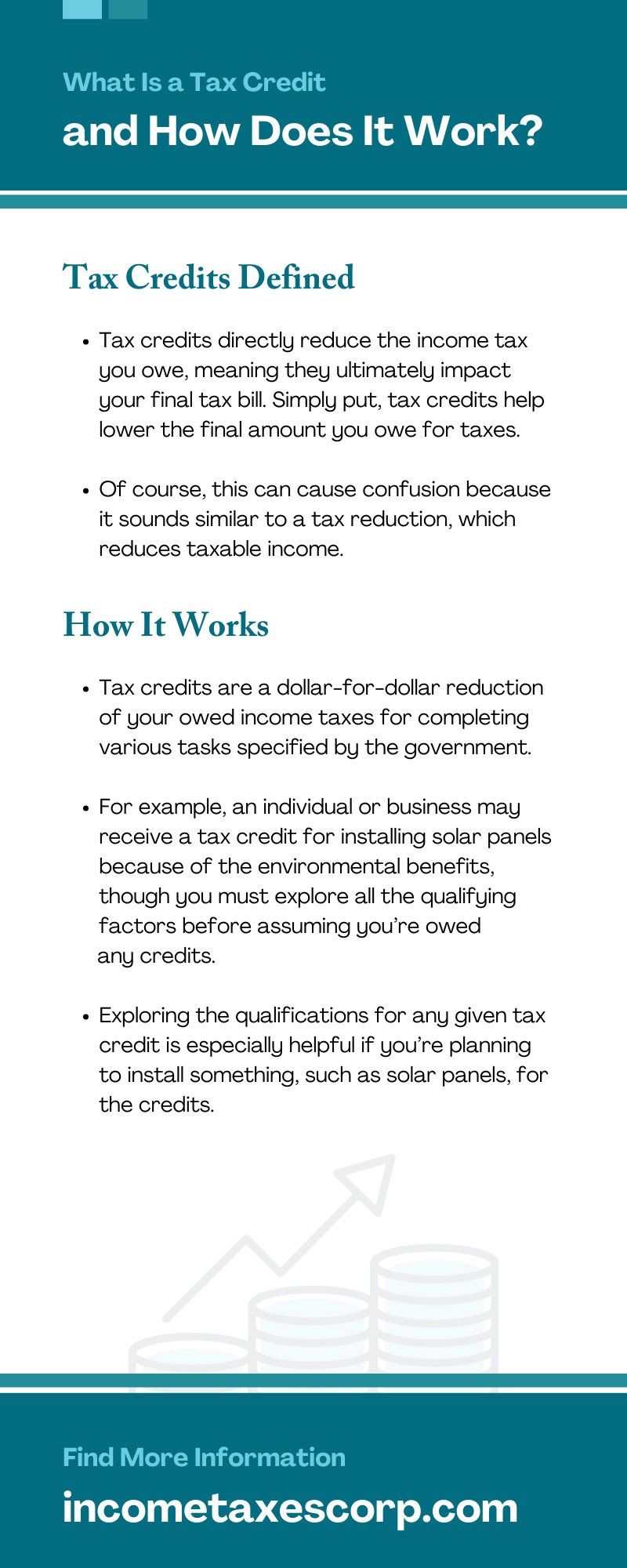What Is a Tax Credit and How Does It Work?
- By Elizabeth Hammond
- •
- 29 Nov, 2022
- •

Tax credit is one of the most important terms in the tax world to understand. Tax credits can greatly benefit businesses and individuals when April arrives. It’s easy to confuse a tax credit with a tax deduction, which is also a beneficial term to know, but the two are very different. So, what is a tax credit, and how does it work?
How can you earn tax credits for yourself or your business every year? You can answer these questions easily once you read the guide below. Even if you’re working with professional tax services, it’s important to understand things like tax credits so that you can communicate about and complete your taxes properly.
Tax Credits Defined
Tax credits directly reduce the income tax you owe, meaning they ultimately impact your final tax bill. Simply put, tax credits help lower the final amount you owe for taxes. Of course, this can cause confusion because it sounds similar to a tax reduction, which reduces taxable income.
However, where credits and deductions differ is that, according to the IRS, tax reductions lower your income before calculating the final tax you owe. Now, let’s explain how and why the government adds these tax credits to your final bill. After all, these credits aren’t awarded for free, so how can you earn them by the next Tax Day? Not only can you reduce your final tax bill, but you can also earn a tax refund for unused credits—read below to learn more.
How It Works
Tax credits are a dollar-for-dollar reduction of your owed income taxes for completing various tasks specified by the government. For example, an individual or business may receive a tax credit for installing solar panels because of the environmental benefits, though you must explore all the qualifying factors before assuming you’re owed any credits. Exploring the qualifications for any given tax credit is especially helpful if you’re planning to install something, such as solar panels, for the credits. This is because knowing the qualifications before the installation means you can build panels, roofs, and beyond to the proper specifications. In addition, remember that you can receive credits toward both state and federal income taxes.
The state of Illinois currently offers a handful of tax credits, one of which is the Invest in Kids credit, which provides a 75-percent income tax credit if you contribute to any qualified scholarship granting organization. The Invest in Kids credit is available for both businesses and individuals to use. This encourages a wide range of people to give money to beneficial organizations and causes and rewards them when Tax Day comes around. If you want to start using credits, we must break down the options available to you, whether you’re researching for your personal taxes, business taxes, or both.
Different Tax Credits
Now that you know what a tax credit is and how it works, we can discuss the different types of credits available. Whether you’re looking for state or federal income tax credits, you have various options to consider. First, let’s break down credits into two categories—refundable and non-refundable. Then, we can dive deeper into more specific credits available right now.
Refundable vs. Non-Refundable Tax Credits
Earning a refundable tax credit means that you earn the full amount of the credit. This may sound like a no-brainer, but it’s not always going to work out perfectly where the credit gets your liability down to $0. In some cases, you may have a $2,000 credit, but a tax bill of only $1,500. In this case, you would earn a $500 tax refund to accommodate the remaining tax credit.
However, if we took those same numbers and swapped the refundable tax credit for a non-refundable one, you would not get that additional $500. A non-refundable tax credit will not take you beyond that $0 liability. You may still get your tax liability to $0 with a non-refundable tax credit, but you cannot transfer any leftover credits into a tax refund. Since you can now separate refundable and non-refundable tax credits, let’s look at more specific opportunities you may qualify for today.
Children, Residential Energy, & More Common Credit Opportunities
Before we go, it’s essential to understand some of the additional tax credits offered by the IRS that you can explore before the next Tax Day. One common tax credit pertains to energy efficiency at home. Completing Form 5695 provides homeowners with a way to utilize a non-business energy property credit, or the residential energy efficient property credit.
This doesn’t just help with Tax Day; it also encourages homeowners to explore energy-efficient alternatives at home. For example, if you have a metal roof, skylight, and other home design elements that meet or exceed Energy Star program requirements, you should see if you qualify for an IRS tax credit.
Another opportunity you can obtain through the IRS is the Child Tax Credits, which is worth exploring further if you’re a family with eligible children. Plus, this is only a glimpse at the tax credits available, with others including earned income, adoption, and more. Remember to stay up to date with your state’s tax credit opportunities every year so that you’re never unaware of opportunities in the future.
Preparing Your Taxes With Professionals
Professional services can work with you on personal and business taxes so you’re ready when Tax Day comes around. For example, at Accutax Business Center, our individual tax services include the Individual Tax Preparation package, which comes with Form 1116 for the Foreign Tax Credit.
Thanks to the guide above, you can start working with tax professionals today with more clarity, preparing the right plan for you or your business before the next Tax Day arrives. Just because you’re not currently aware of the many tax credits available doesn’t mean you aren’t eligible for one or more. Work with your tax professionals today so you can get the credits you’re rightfully owed, or start working towards earning any that capture your interest. Either way, you can start putting this information into action as soon as you’re ready.












